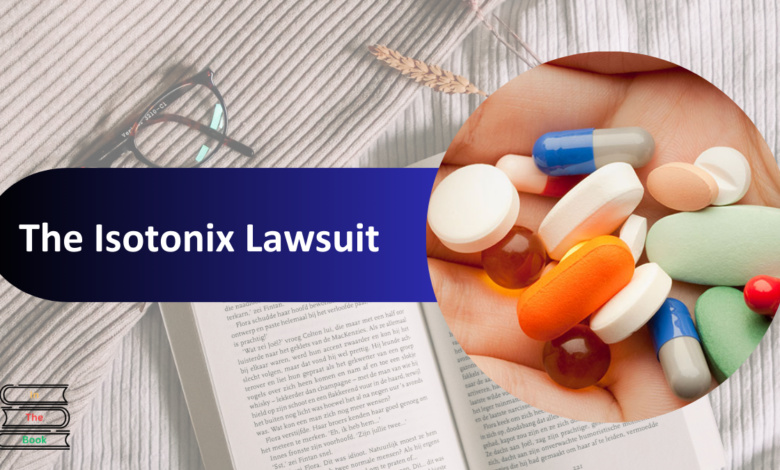Isotonix Lawsuit: Exploring Allegations and Outcomes

Introduction to the Isotonix Lawsuit
The Isotonix lawsuit has garnered widespread attention due to its potential ramifications for consumers and the health supplement industry at large. Isotonix, a well-known brand under the Market America umbrella, has faced allegations that challenge its marketing practices, product claims, and business model. These issues highlight growing concerns about the transparency and integrity of health supplement companies, especially those operating under multi-level marketing (MLM) structures.
The lawsuit stems from claims that Isotonix engaged in misleading practices, raising questions about its compliance with consumer protection laws. These allegations underscore the need for greater scrutiny of health supplement companies that promise significant benefits without substantial scientific backing. As the case unfolds, it offers valuable insights into the intersection of health, business ethics, and consumer rights.
This article delves into the details of the Isotonix lawsuit, exploring its origins, the allegations, and the broader implications for consumers and the MLM industry. By examining these aspects, readers can better understand the significance of this legal battle and its potential impact on the health supplement market.
Background on Isotonix and Its Business Model
Isotonix is a prominent health supplement brand known for its powdered nutritional supplements designed to be mixed with water for quick absorption. Market America, the parent company, markets these products as scientifically advanced solutions for health and wellness. From vitamins and minerals to targeted solutions for joint health and digestion, Isotonix claims to address a wide range of health concerns.
The brand operates under Market America’s MLM structure, where distributors earn income not only through direct sales but also by recruiting others into the network. While this model promises lucrative opportunities, it has also drawn criticism. MLM structures are often accused of prioritizing recruitment over product sales, leading to allegations that they resemble pyramid schemes.
This controversy is central to the Isotonix lawsuit. Critics argue that the focus on recruitment undermines the legitimacy of the company’s products and creates financial risks for distributors. Furthermore, MLM models often face scrutiny for disproportionately benefiting top-tier members, leaving most participants with minimal earnings. These factors set the stage for the legal challenges that Isotonix and Market America now face.
The Core Allegations in the Lawsuit
The Isotonix lawsuit centers on several key allegations, each of which highlights potential ethical and legal violations. First and foremost, the lawsuit accuses the company of making misleading claims about the efficacy of its products. Consumers have alleged that Isotonix supplements do not deliver the health benefits promised in the marketing materials, raising concerns about false advertising.
Another significant allegation pertains to the MLM structure employed by Market America. Plaintiffs argue that the company’s business model prioritizes recruitment over genuine product sales, effectively functioning as a pyramid scheme. This claim has serious implications, as pyramid schemes are illegal under U.S. law and can result in severe penalties.
Additionally, the lawsuit highlights potential violations of consumer protection laws, including the lack of scientific evidence to substantiate health claims made by Isotonix. Such practices not only undermine consumer trust but also pose risks to public health if individuals rely on unverified supplements to address medical conditions.
The lawsuit’s timeline reveals a series of legal maneuvers, with plaintiffs presenting evidence of deceptive practices and the defense countering with denials and justifications. As the case progresses, it will likely set a precedent for how health supplement companies and MLM businesses operate in the future.
Legal Proceedings and Outcomes (If Available)
At the time of writing, the Isotonix lawsuit remains an active legal matter. The proceedings have involved extensive documentation, witness testimonies, and expert analyses. Key developments include initial filings that outline the allegations and responses from Market America’s legal team, which has denied wrongdoing and emphasized the legitimacy of its business practices.
While no final verdict has been reached, the case has already sparked debates about the regulation of MLM companies and health supplement marketing. If the plaintiffs succeed, Isotonix and Market America could face significant financial penalties and be required to implement changes to their marketing and business practices.
For consumers, the outcome of this lawsuit could influence how health supplements are marketed and sold. Regulatory bodies may take a more active role in scrutinizing product claims, ensuring that companies provide scientific evidence to back their assertions. For Market America, the stakes are high, as the lawsuit’s resolution could impact its reputation and profitability.
Implications for Consumers and Distributors
The Isotonix lawsuit carries profound implications for both consumers and distributors. For consumers, the allegations raise concerns about the reliability of health supplements and the transparency of companies that market them. If the claims of false advertising are proven true, it could erode trust in Isotonix and similar brands, prompting consumers to demand greater accountability from supplement manufacturers.
Distributors, who form the backbone of Market America’s MLM network, may face additional challenges. The lawsuit’s focus on the MLM structure highlights the risks associated with such business models. Many distributors invest significant time and money into building their networks, only to find that their earnings fall short of expectations. This case underscores the importance of thoroughly researching MLM opportunities before committing to them.
On a broader scale, the lawsuit serves as a wake-up call for the health supplement and MLM industries. Companies must prioritize transparency, scientific validation, and ethical business practices to maintain consumer trust and avoid legal challenges. For consumers, the case highlights the need to approach health supplements with caution, relying on reputable sources and evidence-based recommendations.
Public Perception and Media Coverage
The Isotonix lawsuit has attracted significant media attention, with various outlets covering the case’s developments and implications. Headlines often focus on the allegations of misleading practices and the broader criticisms of MLM business models. This coverage has fueled public debates about the ethics of health supplement marketing and the challenges faced by MLM distributors.
Social media platforms have become a hub for discussions about the lawsuit, with consumers and former distributors sharing their experiences. Some have voiced support for the plaintiffs, citing their own frustrations with Isotonix products or Market America’s business practices. Others have defended the company, arguing that MLM success depends on individual effort and dedication.
Experts in consumer protection and business ethics have also weighed in, emphasizing the need for stricter regulations in the health supplement and MLM sectors. These perspectives highlight the growing demand for accountability and transparency in industries that directly impact consumer health and financial well-being.
Conclusion: isotonix lawsuit
The Isotonix lawsuit represents a critical moment for the health supplement and MLM industries. It raises important questions about the ethical and legal standards that companies must uphold to protect consumers and ensure fair business practices. As the case unfolds, its outcome could set a precedent for how similar businesses operate and are regulated in the future.
For consumers, this lawsuit serves as a reminder to approach health supplements with caution, demanding evidence-based claims and prioritizing products from reputable companies. For distributors and those considering MLM opportunities, it underscores the importance of thoroughly understanding the business model and its potential risks.
Ultimately, the Isotonix lawsuit highlights the need for greater transparency, accountability, and consumer protection in industries that directly impact health and financial security.

